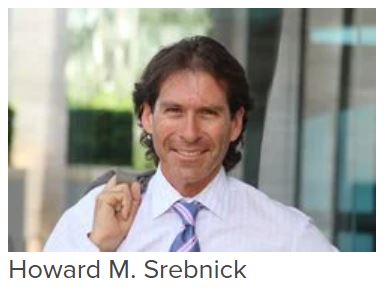Miami Lawyers Help Client Regain About $1 Million in Seized Property

“It is an important decision and an important reminder that Fourth Amendment rights must be taken seriously,” said Bruce Rogow, a political law expert not involved in the litigation.

Florida’s Fourth District Court of Appeal made a decision on whether a Wellington man gets to keep assets seized in a sting operation conducted by the Broward Sheriff’s Office.
 Howard M. Srebnick was retained by Martin J. Zarcadoolas in an effort to retrieve more than $1 million in cash, jewelry and other items taken from his home after law enforcement agents filed and executed a warrant in a civil forfeiture action.
Howard M. Srebnick was retained by Martin J. Zarcadoolas in an effort to retrieve more than $1 million in cash, jewelry and other items taken from his home after law enforcement agents filed and executed a warrant in a civil forfeiture action.
Also representing the appellant were Benjamin S. Waxman and Jeanelle Gomez of Black Srebnick in Miami.
At issue: the Fourth Amendment to the U.S. Constitution, which protects from unreasonable searches and seizures by the government.
“It is an important decision and an important reminder that Fourth Amendment rights must be taken seriously,” said Bruce Rogow, founding professor at Nova Southeastern University Law Center and a political law expert not involved in the litigation. “Overzealous law enforcement, especially misleading search warrant affidavits, raises questions about the integrity of those charged with protecting constitutional rights. There is no room in search warrant affidavits for ‘ghost’ authorship.”
The sheriff’s office alleged evidence of an illegal gambling scheme involving Zarcadoolas and others, primarily based in Broward County beginning 2018, according to court records.
Officers executed a search warrant after several alleged anonymous tips to the Broward Sheriff’s Office, according to the appellate court.
But the appeals ruling noted discrepancies, including which officers wrote and signed the affidavit to support the search warrant.
Click here to read the full appellate opinion
The first part of the appeal was based on a nonfinal order from Broward Circuit Judge Nicholas Richard Lopane, who denied Zarcadoolas’ motion to suppress the seized evidence.
The second part of the appeal addressed an order finding probable cause under the Forfeiture Act for the continued seizure of those items and the seized bank accounts totaling more than $1 million in cash and items.
The court reversed both orders and remanded with instructions to order the Broward Sheriff’s Office to return the property to Zarcadoolas.
The appellate opinion also noted that “to date, no criminal charges have been filed against Zarcadoolas.”
Background
The underlying case stemmed from a tip concerning alleged illegal gambling, bookmaking and money-laundering activity.
The ruling stated that the Broward Sheriff’s Office alleged that “[t]he organization allegedly used offshore websites to take high-dollar bets on various sporting events, collected its proceeds in cash, and then laundered the cash in various ways.”
The appellate decision mentioned that law enforcement investigated the organization from December 2018 through March 2021, and allegedly developed probable cause to believe that Zarcadoolas was one of four members also investigated.
A circuit court judge ruled that there was probable cause, and at first Palm Beach County Sheriff’s Office executed the warrant, but then the Broward Sheriff’s Office notified Zarcadoolas that it was seizing the funds in the two bank accounts, as well as cash, gold coins and casino chips from his home, pursuant to the Forfeiture Act.
Constitutional Issue
David Markus, a Miami criminal defense lawyer at Markus/Moss who is not involved in the litigation, said the court should be commended for protecting Fourth Amendment rights, which often don’t get much attention.
“Unfortunately, the court did not name the officers who violated the constitutional rights of one of our fellow citizens, including signing a search warrant affidavit under oath that was misleading,” Markus said.
At issue, according to the appeals court, was whether the trial court erred in denying Zarcadoolas’ motion to suppress the seized items. Also at issue was whether the trial court erred in finding probable cause under the Forfeiture Act for the two seized bank accounts and Zarcadoolas’ home items.
The appeals court concluded, “BSO failed to meet its burden because it did not present any evidence that any of the funds in either bank account could be traced to cash proceeds from the organization’s alleged bookmaking activity.”
The appellate panel also found that “[t]he trial court erred in finding probable cause under the Forfeiture Act for the continued seizure of Zarcadoolas’ property. On remand, the court must order BSO to restore Zarcadoolas’ access to the seized Chase Bank and Bank of America accounts and return the cash, gold coins, and casino chips that were seized from his home.”
Attorney Kristin Gail MacKenzie of the general counsel office of the Broward Sheriff’s Office, represented the sheriff in the matter.
When contacted, a sheriff’s public Information officer said, “BSO is reviewing the ruling from the Fourth District Court of Appeal and will consider its options.”
Three other defendants in the underlying case are still litigating.
